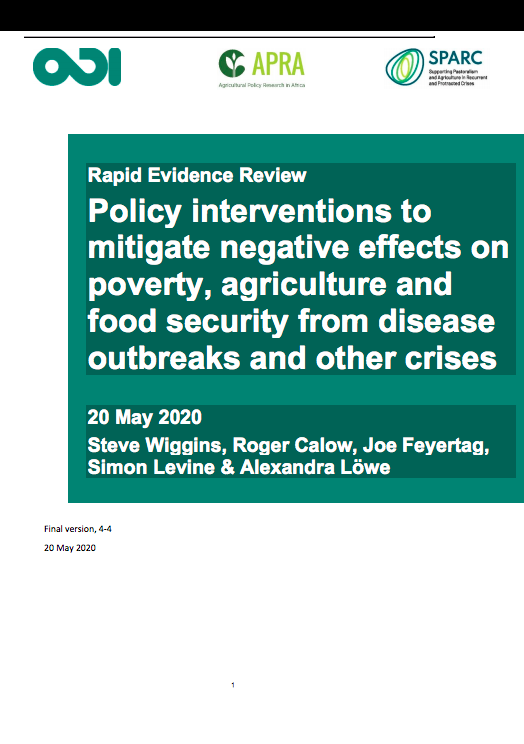Back to Library
Policy interventions to mitigate negative effects on poverty, agriculture and food security from disease outbreaks and other crises

Published by:
Document
Download
Online Location
https://www.future-agricultures.org/publications/rapid-evidence-review-policy-interventions-to-mitigate-negative-effects-on-poverty-agriculture-and-food-security-from-disease-outbreaks-and-other-crises/
Publication date
20/06/2020
Number of Pages
172
Language:
English
Type of Publication:
Studies
Focus Region:
Middle East & North Africa
Sub-Saharan Africa
Focus Topic:
Agricultural Value Chains / Agri-Businesses
Nutrition / Food Systems
Institutions / Organizations
Type of Risk:
Biological & environmental
Type of Risk Managment Option:
Risk reduction/mitigation
Commodity:
Other
Author
Steve Wiggins, Roger Calow, Joe Feyertag, Simon Levine & Alexandra Löwe
Organization
Overseas Development Institute (ODI); Agricultural Policy Research in Africa (APRA) programme; Supporting Pastoralism and Agriculture in Recurrent and Protracted Crises’ (SPARC) programme
SUMMARY
This review draws lessons from previous shocks that may be relevant to dealing with the consequences of COVID-19 for agriculture, food systems, food security and rural livelihoods in developing countries and especially in sub-Saharan Africa. Most of the evidence comes from reviewing seven viral health crises and two economic shocks.
Few other health crises resemble the COVID-19 outbreak. Lessons from previous crises may therefore not be directly applicable to the current pandemic. It remains to be seen (in early May 2020) how the disease will develop in rural areas. There is a risk, however, that the economic consequences of measures to control the disease may be stronger than those of disease itself.
Five such consequences may be seen:
- Agricultural output may fall, mainly owing to reduced demand for perishables and air-freighted export crops.
- Women may face additional work in caring for the sick, on top of their often already heavy workloads — their daughters may be taken out of school to help them.
- Rural household incomes will fall, particularly for households that rely on high-value perishable agricultural crops and air-freighted export, on rural non-farm business and employment, and on remittances from migrants in urban areas — both domestic and international.
- Some business in the food supply chains may go bankrupt as demand falls and transport is disrupted.
- Food insecurity may rise, in both rural and urban areas, mainly due to lower household incomes and possibly from higher agricultural prices.
Keywords: Covid-19